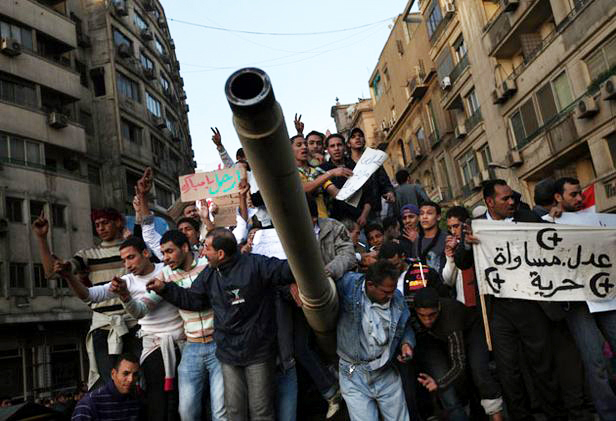
The courage and anger of the Egyptian people on the streets of cities across the country is shaking the entire edifice of imperialism in the Middle East and North Africa. They shout for ‘bread and freedom’ and declare ‘a day of revolt against torture, poverty, corruption and unemployment’ and tilt the balance against Zionism and the US. President Mubarak is clinging on to power but the masses are refusing to end their uprising.
Protests, inspired by the Tunisian revolt, began on 25 January, and gathered momentum until, on 28 January, hundreds of thousands of people poured onto Cairo’s streets and converged from all directions on Tahrir Square in the centre of the city. Street fighting with thousands of plain-clothes and uniformed police ensued. The government had shut down the internet and mobile phone networks, but to no effect. Police rained down tear gas canisters, drenched demonstrators with water cannon, fired rubber bullets, stun grenades and live ammunition; still they were forced to retreat as the people occupied the Square – a symbolic victory – ‘Mubarak, Mubarak, Saudi Arabia is waiting for you’, they shouted for the Egyptian President to go. The headquarters of the ruling National Democratic Party was set ablaze and police stations were torched.
Egyptian security officials reported protests in 11 of the country’s 28 provinces; Luxor, Port Said, Alexandria and Suez saw protests and battles. In Suez, protestors occupied the police headquarters and seized weapons. By 29 January 13 people were reported killed in Suez and 34 dead throughout Egypt, but the real figure will no doubt be higher. Police reported 750 police and 1,500 protestors wounded.
At midnight on 28/29 January President Mubarak made a television broadcast asking his cabinet to resign and saying he would form a new government. In defiance of the curfew imposed, protestors returned to Cairo’s streets the following day to reoccupy Tahrir Square.
Political explosion
The gap between Egypt’s rich and poor has been widening. Egypt, with 80 million people, is the Arab world’s most populous country: some three million Egyptians live in luxury, contemptuously displaying their wealth, while 80% of the people live on less than $3,000 a year and 44% live on or below the poverty line of $2 a day. There has been zero per capita income growth since the mid-1980s. 37% of the population are under 15 years of age and 60% are younger than 25. A quarter of young men and 60% of young women are unemployed. Over the past decade the Egyptian pound has lost half its value against the US dollar, driving up food prices. Riots erupted in 2008 in response to 20% food price rises.
On 28 January WikiLeaks released a US Egyptian embassy cable stating we ‘estimate there are literally hundreds of torture incidents every day in Cairo police stations alone’. A 1981 Emergency Law allows security forces to search without warrants and detain indefinitely without charge. Security forces number about two million officers. In the 2005 elections 20% of parliamentary seats went to the Muslim Brotherhood. Two senior judges sought an inquiry into electoral fraud and asked for constitutional reform. The regime sacked them. Judges responded with protests and sit-ins which drew widespread support. In the November 2010 election the Muslim Brotherhood withdrew, claiming rigging and harassment. The result was almost no opposition candidates against Mubarak and his party. Initially, the Muslim Brotherhood opposed the January 2011 protests.
Mubarak’s predecessor, Anwar Sadat, signed the Camp David accords with Israel in 1978. He was assassinated in 1981. Since then Egypt has been second only to Israel as a recipient of US aid. US aid for the current year is $1.5bn, of which $1.3bn is allocated to the military.
The Egyptian–Israeli accord is central to US domination of the Middle East. The explosion onto the Egyptian streets threatens to become a political explosion under imperialism. Zionists and the Palestinian Authority will be looking on nervously. On 28 January a White House press spokesperson confirmed that the US Pentagon is in constant contact with Egypt’s military command. US President Obama said, ‘The United States will continue to stand up for the rights of the Egyptian people and work with their government in pursuit of a future that is more just, more free and hopeful.’ British ministers echo the US. It will not have been lost on the Egyptian people that the tear gas canisters poured down on them are marked ‘Made in the USA’.
US and European imperialism will calculate how reliable an asset the Egyptian army is; Mubarak is expendable. Any advance for the Egyptian masses is a victory for all the masses of the Middle East and North Africa and above all for Palestinians. Imperialism is in crisis, the forces of its destruction are in play.
Trevor Rayne
FRFI 219 February / March 2011




